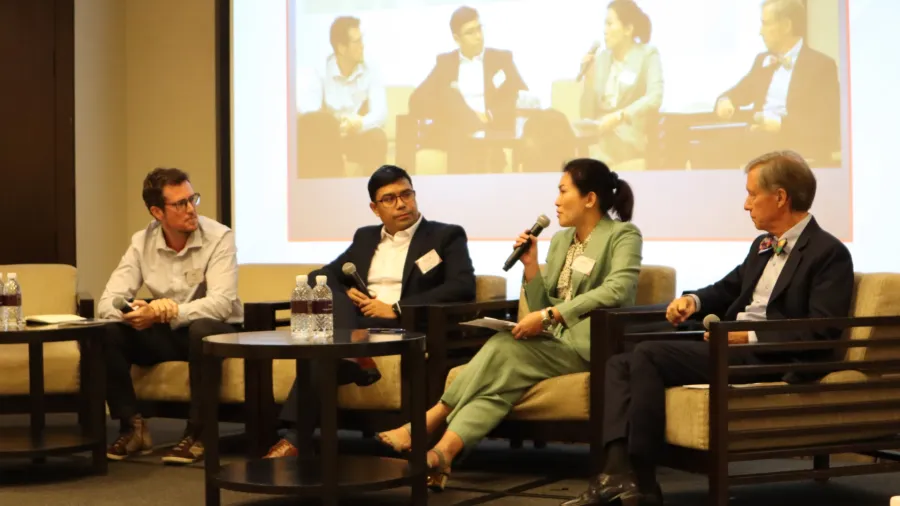
Industry leaders tackle opportunities, challenges faced by healthcare providers in Healthcare Asia Summit 2023
The event was attended by experts and leaders in the healthcare sector.
Over the last three years, there have been significant changes in the global healthcare scene, particularly in Asia, compared to the past 20 to 30 years. Now that the industry is moving into a post-pandemic era, organisations must continue to learn, adapt, and ensure that they will be able to provide sustainable services to their patients.
In line with this, the Healthcare Asia Summit 2023 in Singapore has brought together professionals from across the Asia Pacific to discuss the future of healthcare. The event was attended by 157 in-person attendees from Asian countries and nearly 1,000 other participants who joined online through Zoom, Facebook, and Linkedin.
Evolving patient needs and opportunities for healthcare providers
Alex Boulton, Partner at Bain & Company, started the presentations with a discussion on the healthcare services demand in Asia as patients are experiencing long waiting times and high expenses. Boulton presented findings showing a rising shift towards consumerism in healthcare, a shake-up in trust, a desire for simplicity and convenience, and a preference for digital engagement and a single touch point for managing overall healthcare needs.
Boulton then talked about opportunities for healthcare ecosystem participants: to simplify the patient journey, create an integrated continuum, provide value-based care, and empower patients and physicians to drive productivity to close the supply gap. He also noted that the breaking down of silos and the need for collaboration could solve the challenges facing the healthcare industry.
“This is not a sector where you're thinking intensely about your competitor and how you out-compete. It needs to be thinking about how we sort of come together and solve the challenges,” said Boulton.
Meanwhile, Yong Yih Ming, Chief Executive Officer at Mount Elizabeth Hospital at IHH Healthcare, gave a provider perspective on evolving patient needs. Yih Ming highlighted the government's role in ensuring equal access to healthcare through a safety net.
Given this, he emphasised the importance of value in healthcare and the development of methodologies to ensure appropriate treatment and consistent practice. He also mentioned the focus on digital initiatives that aim to promote healthy lifestyles, not just treatment.
Dr Walter Lim, Singapore Managing Director at Fullerton Health, talked about building a sustainable future for medicine, ideally for the next 10 years.
Firstly, he emphasised the importance of preventive care. “The crux of it really is prevention is better than cure, which is really the fundamentals of healthcare. And this is what I mean by building from the ground up,” he explained. Secondly, Lim said there is a need to “build for populations” and support vulnerable populations. Lastly, he highlighted the need to build patient journeys by building a strong foundation for health education.
Joining the first panel were Lim Wai Mun, Founder & CEO of Doctor Anywhere; Andrew Wong, Chief Health Officer of Prudential plc; and Serene Cai, Co-Founder of Speedoc. The session, led by Boulton, discusses the future of telemedicine in healthcare and how it has rapidly gained adoption during the pandemic.
The panellists mentioned the importance of understanding how technology is evolving to include remote monitoring, big data collection, and AI. They also agree that telemedicine is becoming an essential tool for healthcare providers to enhance their practice, though it will not replace in-person care completely.
Partha Basumatary, Principal of Boston Consulting Group, talked about climate and sustainability in healthcare in his session. He stressed that environmental, social, and governance (ESG) practices should not be treated as just one initiative but instead as a “strategic advantage.”
For his part, Bumrungrad International Chief Partnerships Officer David Boucher talked about the medical value of travel in the post-COVID world, caused by significant delays in elective procedures and chronic illness treatments. In addition, telemedicine and remote monitoring are also becoming integrated into medical value travel, making it easier for doctors to follow up with patients from around the world.
Adjunct Assistant Professor Kelvin Tan, Senior Consultant and Head of Service (Adult Reconstruction) of Tan Tock Seng Hospital, reflected on the challenges brought by the pandemic to healthcare in Singapore, such as the bed and manpower crunch, the need for advanced training for nurses and doctors, and the impact on elective surgeries. Patients’ mindsets were likewise changed by the pandemic, as they now have the desire to go home earlier, leading to an increase in ambulatory surgeries.
For Tan, ambulatory surgery is the way forward, but he also looked into alternative solutions such as virtual healthcare services that can encourage patients to recover at home and digital health like wearables and mobile apps, which allow for a less tiring experience for both patients and healthcare providers. Tan also considers a paperless, accessible, and unified platform to store healthcare data as a “dream,” but stresses the need for privacy and cybersecurity.
Sustainable Financing and Operational Excellence
For the second panel, Boucher, Basumatary, and Sunway Healthcare Group Finance Director Chelsea Cheng talked about sustainable healthcare financing in a discussion led by Pureland Group Partner Chris Hardesty.
From a hospital's perspective, Boucher highlighted the importance of taking a whole-of-society approach and considering the human factor in financing decisions. He stressed that employees must be treated with dignity and respect, whilst other costs can be cut by reducing waste. From a patient perspective, Cheng noted that patients tend to do financial modelling based on best-case scenarios. As such, she believes healthcare financing should be managed with a whole-village approach. “It's not just the individuals, not just the government, not just the private sector. That really, it's a whole village approach,” she said.
Meanwhile, Basumatary admitted that there is no “silver bullet” for innovative financing concepts in healthcare. Still, he identified two main problems: the source of money and the delivery mechanism for affordable healthcare. The first requires systemic changes, whilst the second can be addressed with innovative solutions, such as financing options that allow patients to pay in instalments.
Kearney Partner Sanath Kumar Balasubramanyam discussed “Operational excellence to deliver value-based care” for his speaking session. He acknowledged that several challenges need to be addressed from an operational standpoint, then proposed ways to use digital means to move towards efficiency improvements.
InterSystems' Director for Customer Relations and Sales – Healthcare in Southeast Asia, Stella Ramette, talked about Fast Health Interoperability Resources (FHIR). She stressed the need to break down dialects in all data systems and instead embrace a lingua franca so everyone can do the same thing, whether they are working in a hospital or insurance company, amongst others.
Vejthani Hospital Chief Operating Officer Dr Tullawat Pacharapha discussed key trends in hospital management that have already been adopted: delivering outcomes that matter to patients, managing patient experience both in person and digitally, enhancing team collaboration, adopting automation and AI to improve efficiency, and using data and analytics to inform decision making.
For his session, EY Asean Life Sciences and Health Care Leader Abhay Bangi talked about various dimensions of value-based healthcare. Stakeholders in the system have different definitions of value, which makes it challenging to agree on the most critical data points necessary to address value.
Bangi suggested that creating a neutral definition of value, aligning data collection and sources, creating a safe environment for collaboration, investing in the business case and payment model, and upskilling frontline workers are essential steps to implementing value-based healthcare successfully. He also emphasised the importance of the five golden rules, which include considering objectives, tracking outcomes, identifying data sources, evaluating the workforce's maturity, and analysing payment models.
Value-Based Healthcare: Collaboration and Benefits
The third-panel discussion was on Value-based Healthcare and its Benefits to Stakeholders in the Ecosystem. It featured Dr Clive Tan, Assistant Chief of Group Integrated Care (Population Health) at National Healthcare Group; Cindy Choe, CEO at Prince Court Medical Centre; Dr Ethan Lim, Medical Director at Fullerton Health; and Susan Fanning, Health Insurance Industry Expert & Health Actuary. The discussion was moderated by EY-Parthenon Partner Dr Num Tanthuwanit.
Tan emphasised the importance of collaboration in delivering good value-based care, which is often delivered in small pockets that don't connect due to data and trust issues. Lim stressed the importance of identifying the right partners who share the same vision and goals. The conversation also touches on the need to look beyond disease-specific outcomes and focus on functional indicators, such as cognitive function and social and mental well-being.
Choe also discussed the lack of collaboration between private providers and private payers in Malaysia, noting that there is a need for a regulatory framework that incentivises sustainable value-based healthcare practices. Fanning then highlighted that all players in healthcare are ultimately working towards the same goal of helping patients receive the proper treatment at the right time in the most affordable way possible, whilst also achieving good outcomes. She emphasises the need for transparency and trust amongst all parties involved and suggested that open conversations can help achieve this and insurers need to understand the suitability and effectiveness of treatments to ensure that patients can continue to afford care in the long term.
Stephen Sunderland, L.E.K. Consulting Partner and Head of SE Asia Healthcare and Life Sciences delved into the 2023 healthcare M&A landscape and key drivers during his speaking session. He noted that investors continue to be interested in healthcare as an asset class due to its underlying profitability and growth prospects. Whilst there was a drop in deal volumes and values in 2022, deals are still being done.
The M&A market is weathering the banking crisis in a much more balanced fashion than during the 2008-2009 disruption. There are also quite a few assets coming up for sale. There is a lot of capital available for deployment, and the outlook for the second half of 2023 is optimistic for both buyers and sellers in the healthcare market.
AI's potential in healthcare
For the final panel, Bangkok Hospital Rayong's Chief of Academic Center Dr Gunnaphon Anamnart and Changi General Hospital's Deputy Chief Medical Informatics Officer and Senior Consultant Dr Charlene Liew shared their thoughts on the applications, issues, and regulatory approaches to AI in healthcare. The discussion was moderated by Arnaud Bauer, Partner at L.E.K. Consulting.
Anamnart narrated how AI has been used amidst the COVID-19 pandemic to read chest X-rays and prioritise patient treatment. He believes that AI can make the work of physicians easier and more patient-centred by reducing paperwork and prioritising patient treatment.
Meanwhile, Liew stressed the importance of creating foundational models for all aspects of knowledge, including biology, healthcare, and imaging. She also believes that large models will allow for foundational models in healthcare, whilst governments have had time to study and proactively create boundaries for the safe and secure use of AI.
Liew further explained that the goal of AI in healthcare is not to replace physicians but rather to assist them by taking away some of the administrative burdens that physicians face. Liew also noted that physicians are not as afraid of AI as some might think and that the COVID-19 pandemic has accelerated the realisation that AI can be a valuable tool in healthcare.
“I think we have reached that point where we realised that we need help, and I think COVID actually accelerated that realisation. So I think AI is not going to make us more mechanical or robotic. It’s going to make us more human. And I think that's the key,” she said.
The event ended with a speaking session on health economics in the private sector after the COVID-19 disruption done by Dr Gunnaphon Anamnart, the Chief of Academic Center at Bangkok Hospital Rayong. Anamnart drew attention to the need for flexibility, shared decision-making, and reimagining company structures to align with the new normal. He also suggested that early detection, collaboration with hospital networks, patient education, and access to resources are important for maintaining patient health.
Additionally, he emphasised the need for staff to have access to data and resources to improve service and treatment, and the importance of patient and staff participation to evaluate service improvements.
"We experience some barriers [to] the accessibility to our resource because we secure to the data too much and sometimes we need to break down a barrier that our staff cannot access to our resource because they work for you every day, they meet a patient, but I think our staff know the patient better than us,” he said.

















 Advertise
Advertise





